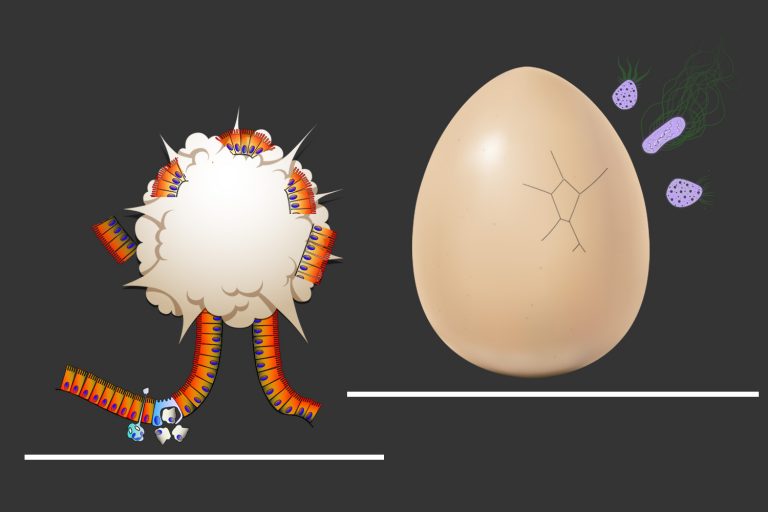29 Mar Importance of gut health in layers and breeders

Optimal gut health is of vital importance to the performance of layers and breeders
What is gut health?
Gut health is defined as the “ability of the digestive system to perform normal physiological functions and to maintain homeostasis, thereby supporting its ability to withstand infectious and non-infectious stressors”
Gut health covers:
- The structural integrity of the gut
- The balance of the microflora
- The status of the digestive immune system
Optimal gut health is of vital importance to the performance of production animals, including layers and breeders.
The importance of gut health in pullets
As it is well known, a good pullet quality is the foundation for optimum performance during the laying period.
The digestive system develops mainly during the first 6 weeks of life of the pullet. If any digestive disease happens during this period, it could impair normal functioning of the gut during all the life of the bird.
On the other hand, during the pullet period, poor gut health, mycotoxicosis and digestive problems such as necrotic enteritis, coccidiosis or dysbiosis may worsen the uniformity of the flock. A uniformity under 85% complicates the management of the batch during the pullet and laying stages.
The importance of gut health during the laying period
During the laying period, deficient gut health is related to certain diseases and to poor productivity:
Transmission of bacterial diseases to eggs
There are two possible routes of bacterial infection of table and fertile eggs: either vertically or horizontally. In the case of vertical transmission, the egg is contaminated during its formation process in the ovary or in the oviduct, as a result of a bacterial infection in the reproductive system of the hen. In the case of horizontal transmission, external bacteria coming from the cloaca, feces or the surfaces of the nest penetrate through the eggshell.
In both cases, pathogenic bacteria such as Salmonella sp, Staphylococcus sp, E. coli, Pseudomonas sp and Proteus sp start an infection in the egg. In table eggs, these microorganisms are considered food safety hazards. In fertile eggs, these pathogens are related to diseases of the new born chicks such as omphalitis or yolk sac infection, and poor productivity during early stages.
If the hen is suffering a gut flora imbalance, with a higher proportion of pathogenic microorganisms, it is more likely that pathogenic bacteria migrate from cloaca to the oviduct and ovary and start a bacterial infection in the reproductive system (vertical transmission). On the other hand, a higher number of harmful bacteria in the gut flora also means that eggs are more likely to get contaminated horizontally in the cloaca or by contact with feces or the dirty surfaces of the nest.
Digestive diseases after stress
Hens kept in intensive conditions are constantly subjected to stress due to handling, management practices, changes in diet, etc. In the days that follow the stressful event it is frequent to observe poor gut health, diarrhea, dirty eggs, cracked eggshells and more cases of transmission of bacterial diseases to eggs.
Digestive diseases during the laying period
Layers and breeders, as long-life animals, are continuously subjected to stressors that impair gut health: viral, fungal, bacterial or parasitic infections, poor quality of feed or water, mycotoxins, deficient cleaning and biosafety in the farm, etc.
Egg quality
Each eggshell contains approximately 3 grams of calcium. For an adequate eggshell quality, not only the diet must contain enough calcium, but also the digestive system of the animal must be healthy enough to absorb it. Whenever there is inflammation in the intestine, the absorption of calcium decreases up to 40%. Gross cracks, hairline cracks, star cracks are often related to poor gut health.
Proper functioning digestive system is also related to the absorption of vitamins A and D, the and pigments necessary for a properly colored yolk.
Productivity
Thanks to genetic selection, modern layers and breeders exhibit growing production potential, high laying peaks, increasing persistency of laying rate and decreasing feed conversion rate.
Such high levels of production are only possible if hens are able to optimally digest, absorb and use the nutrients. Hens with poor gut health fail to reach the target peak production, have a poor laying persistency and high feed conversion rate.
Products of choice
PlusProtect Digestive© is intended for digestive health in birds and rabbits of all ages. It is formulated with synergistic ingredients:
- Essential oils with bactericidal and fungicidal activity
- Plant extracts with prebiotic effect.
- Immunostimulant and antioxidant essential oils
PlusProtect Digestive© is useful to improve gut health in the following cases:
- Candidiasis in beak, crop and gizzard
- Bacterial infections in gizzard. In severe cases, it is better to give together with our PlusBind© line (mycotoxin binders)
- Bacterial infections in the intestines (necrotic enteritis; E.coli; Salmonella sp.)
- General digestive imbalances, such as feed passage.
GrowthPlus© is added to feed to maintain and improve digestive health. It is formulated with synergistic ingredients:
- Bactericidal and fungicidal plant extracts, combined with organic acids for better effectiveness, that reduce the number of pathogenic microbes in the digestive system.
- Plant extracts with prebiotic effect, that promote the growth of beneficial bacteria in the gut.
- Immunostimulant and antioxidant plant extracts.
- Silicates with mycotoxin binding function.
It is especially useful in cases of gizzard diseases, necrotic enteritis, feed passage and other enteritis. It is also used as a natural growth promoter and to replace antibiotic growth promoters.

Certain health statements may not be applicable in your region.

